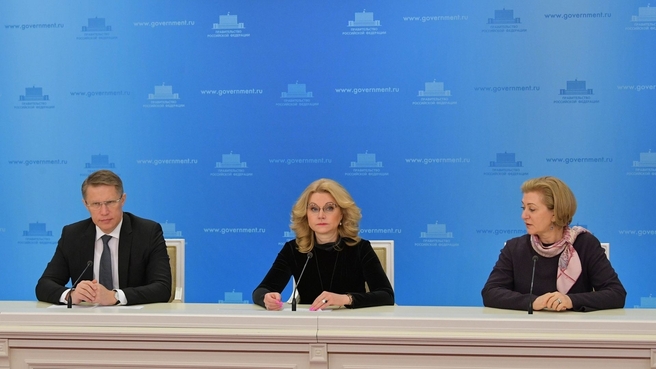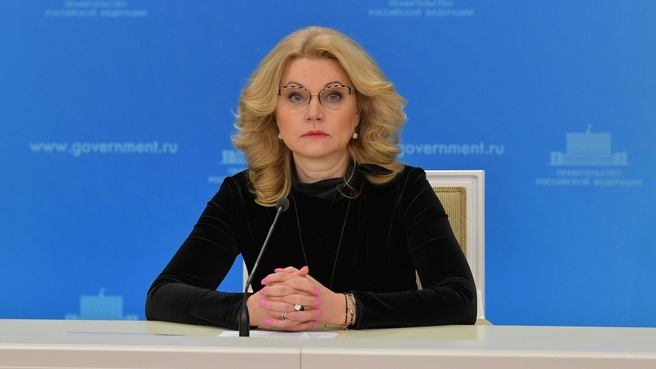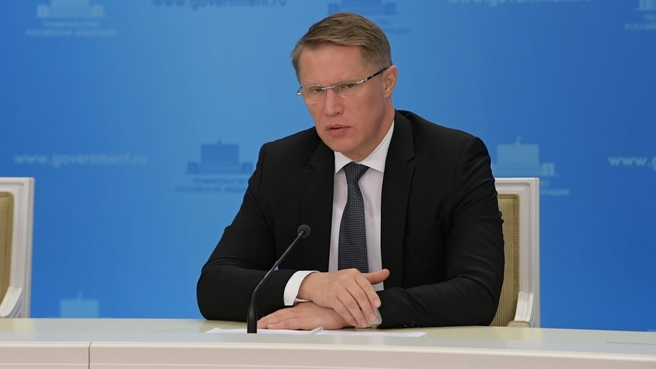Briefing with Deputy Prime Minister Tatyana Golikova, Health Minister Mikhail Murashko and Head of Rospotrebnadzor Anna Popova
Question: Ms Golikova, mass vaccinating against the coronavirus has started in Russia today. What should people know about this?
Tatyana Golikova: Following the instruction of President Vladimir Putin, mass vaccinating has started in Russia today. Russia has a federal law on preventive immunisation against infectious diseases, which regulates a system of measures aimed at preventing, restricting and eliminating infectious diseases by preventive inoculations. The goal is to create specific immunity against contagious diseases.
Implementing measures on preventive immunisation, the state guarantees its citizens access to preventive inoculations covered by the national and epidemiological calendars and free preventive inoculations in state and municipal healthcare facilities.
What does the implementation of these guarantees mean in practical terms today?
As you are aware, the coronavirus infection is on the list of especially dangerous diseases. Hence, there were certain difficulties in the development of the vaccines, which were related to restrictions on the work with the COVID-19 strain. Nevertheless, our scientists developed and registered, the first in the world, the Sputnik vaccine at the Gamaleya Centre, and the EpiVacCorona in the Vektor Centre. The Chumakov Centre is wrapping up its research on the CoviVac vaccine.
The Sputnik vaccine is already being used on a large scale. The Vektor Centre’s EpiVacCorona has been launched into civilian circulation and used for the jabs. Its large-scale production will start in February.
I would like to speak in more detail about the Chumakov’s Centre CoviVac vaccine and the possible time scale for its production and use for the vaccinations.
The CoviVac vaccine is an inactive, whole-virion, purified concentrated vaccine that is being injected twice with an interval of 14 days. It is transported and stored at a temperature of plus 2 to plus 8 degrees Celsius. Clinical research has proven that the vaccine is absolutely safe and has low reactogenisity. The majority of the vaccinated volunteers formed stable immunity on the 28th day of their first jab.
The Chumakov Centre is expected to present to the Health Ministry a package of documents required to start the registration of the vaccine. The earliest time for its registration is February 16, 2021. At present, the Centre is working on the vaccine for the further release control that will be carried out under the law after the vaccine receives its registration certificate.
The vaccine rollout is planned to start in the second half of March. The first batch will include 100,000 doses. Initially, the available production facilities will produce about 7.5 million doses of the vaccine annually.
The Chumakov Centre production facilities are licenced to work with viruses of the second group of pathogenicity, they meet all international requirements for the production of immunobiological preparations, and are the only WHO-prequalified facility in Russia.
As you are aware, priority groups of people in Russia were vaccinated during December and the first ten days of January. The regions were accorded the right, which remains valid until now, to choose their priorities and to vaccinate more people.
Over the past few months, we have been focusing on ways to scale up the production of Sputnik, the world's first registered vaccine, developed by the Gamaleya Centre. This goal has been effectively achieved, which makes it possible to start the mass vaccination of the public today as instructed by the President.
I have already mentioned that we will start large-scale production of the EpiVacCorona vaccine developed by the Vektor Centre in February 2021.
In anticipation of mass vaccination and on the instruction of the President, we held a meeting with researchers in the sphere of epidemiology and virology in order to assess the COVID-19 epidemiological dynamics and to determine the proportion of the population that needs to be immune. Researchers say that mass vaccination is key if we want to control the spread of the COVID-19 infection. The required vaccination level has also been determined by the researchers and stands at 68.6 million people, or 60 percent of the population, excluding those who have been infected and recovered, as well as children under 18. The numbers may vary depending on epidemiological developments.
Research shows that despite the fact that the antibodies in a person who was affected by the virus may gradually wane, the cellular immunity or cellular memory do not necessarily follow. People rarely get sick twice. Our observations show that there are isolated instances. So, the people who have been sick with the novel coronavirus infection should not be in a hurry to get vaccinated.
Based on production capabilities, a preliminary vaccination schedule for the two licensed vaccines is now available and is being adjusted almost daily with more vaccines being rolled out.
According to the preliminary schedule, over 20 million Russians will be able to take the entire or the first portion of the vaccine in the first quarter of 2021.
I would like to note that the difference between the production of vaccines and their use for vaccinating the public is accounted for by high level of quality control, efficacy and safety of immunobiological preparations, which is carried out by Roszdravnadzor as scheduled, in compliance with the established deadlines and in accordance with the Russian legislation. As production increases, more people will be able to take the vaccine at a greater number of vaccination sites using the Government Services website. People will also be transported to such sites in order to take the vaccine.
From now to March, most people will get the Sputnik vaccine. From March, Sputnik and EpiVacCorona vaccines developed by the Vektor Centre will also become available. Provided the CoviVac vaccine developed by the Chumakov Centre gets registered in February, it will also be on the list of available vaccines by late March - early April.
Vaccination is free and voluntary. Its costs will be covered from the federal and regional budgets. Prior to taking the vaccine, the recipient must sign a voluntary informed consent. Only medically fit members of the public can take the vaccine.
Quality control of the vaccines that are registered in the country and clinical and post-registration clinical trials show that the Russian preparations are safe and highly effective.
Friends, we encourage you to take the vaccine.
Question: Mr Murashko, who can already get the coronavirus jab and for whom is it especially important?
Mikhail Murashko: I want to begin by saying that at the initial stage we identified the categories of employees – including medical workers, social workers and teachers – who received the vaccine first. To date, we have completed clinical trials on the use of the vaccines in people over 60 and issued new guidelines on using the Sputnik V vaccine.
Given our information on the disease progression, monitoring over the clinical progression and register data, we advise people over 55 to get vaccinated first. The reason is that people in this age bracket have a more serious disease progression and a higher risk of complications, including unfavourable and fatal outcomes, and this category of people is in need of vaccine protection most of all. Patients with diabetes, arterial hypertension, severe coronary artery disease and obesity should be vaccinated on a priority basis. I want to note that both indications and counterindications are stated clearly in the guidelines on the use of the vaccine.
As for the vaccine quality control, the Russian Federation got a prequalification certificate from the World Health Organisation in 2016 and the Russian system of vaccine quality oversight was recognised as high quality.
Currently, each vaccine series which enters civilian circulation directly for the population is subject to many stages of quality control. First, the manufacturer should obtain a good manufacturing practice compliance licence. The manufacturer should also perform its own laboratory quality control of its vaccines and put them through quality control at the Federal Service for Supervision of Healthcare laboratory. This means that each batch for public use can only be of high quality, and all data is entered into the single register. In addition, the distribution requirements for the companies delivering vaccines include a quality management system, which guarantees maintenance of such quality at the delivery stage.
Question: Tell us, please, about the counterindications to the vaccination. Is it necessary for those who have already been sick with the coronavirus? What is the vaccination procedure?
Mikhail Murashko: As Ms Golikova has already said, those who have already been ill with the novel coronavirus infection, are not to be vaccinated now. We are gathering research information on this issue and will soon produce recommendations on the duration of immunity.
Those who want to get vaccinated must have a passport and a mandatory medical insurance policy. Before vaccination, a doctor takes the patient’s temperature and collects the anamnesis of their diseases, especially chronic ones. If they feel well and have had no respiratory diseases in the past two weeks, they can be vaccinated. There are several medical contraindications, especially if they have concomitant diseases. Therefore, it is important to mention all recent past and present chronic and other illnesses. The decision is made by the doctor.
The main contraindications are serious allergic reactions to the components of the vaccine and several autoimmune illnesses. Depending on the condition of a chronic disease the doctor may decide on the timing of the vaccination. It is not necessary to test for a new coronavirus infection before vaccination.
The instructions do not provide for vaccinating children and teenagers under 18 years as well as pregnant or breast-feeding mothers.
Question: How much time is requited to develop the immunity after the jabs? When can one feel protected against the infection?
Mikhail Murashko: In general, for the body to build immunity, it takes 42 days after the first shot of the vaccine and three weeks after the second shot (this is the same information and the same timescale). Before this, vaccinated people are not protected against infection and must observe all safety requirements.
Three weeks after the second shot when the immunity has built up, it is necessary to continue wearing a mask for the sake of other people until the formation of herd immunity, and the elimination of the virus and its circulation within the national territory because if a person with immunity comes into contact with somebody who is infected they might still carry the virus for a short time and pass on the infection. Therefore, wearing masks is a mandatory requirement after vaccination as well.
I would like to add that now we are creating a resource for scheduling vaccination appointments at the government services website.
The website also has a mobile application for post-vaccination self-monitoring.
At present, the healthcare system has launched adequate vaccination capacities and continues building them up.
Question: Ms Popova, could you give us an update on the coronavirus pandemic?
Anna Popova: The situation remains quite tense, although it is becoming more stable. However, daily numbers of over 20,000 cases represent fairly high levels.
To date, 72 regions are showing stabilisation and decline, while the other 13 regions show a tense epidemiological situation with some growth. The necessary measures to stabilise the situation in these regions are being taken.
That being said, full control over the epidemic situation in the country can only come from high numbers of immunised population. As Ms Golikova has already said, this is 60 percent of the population over 18 minus those who have already been exposed to the virus and officially registered.
The epidemic situation largely depends on our compliance with the rules and requirements. The virus is spreading. The future of the pandemic depends on our compliance with the requirements, which are fairly simple – to wear masks, to wash your hands, to practise social distancing – and our compliance with the requirements at workplaces, schools, colleges and universities.
Question: Rospotrebnadzor has conducted large-scale coronavirus immunity studies in Russia. What are the results?
Anna Popova: Yes, this is a major and important effort. We are still conducting them in 26 regions in three stages.
The first stage was in June-July, the second in August-September, and the third ended in December. Almost 70,000 people were involved in the research at each stage. In all, we have conducted over 160,000 studies.
Today, we can say that the number of people protected by natural post-exposure immunity is growing. Clearly, these numbers vary across different regions, because the intensity of the epidemiological process also varies, but on average, it’s at least 25 percent of the total population of all ages in these regions.
Notably, preschoolers and primary school pupils are the most protected. This age group shows twice as many protected people as other age groups.
Importantly, we determine both qualitative and quantitative immunity numbers. This work continues into 2021. We are now in stage four in order to determine not only post-infection, but also post-vaccination immunity and its role in forming herd immunity in Russia.
Question: Ms Popova, what risk groups should the regions keep in mind when deciding whom to vaccinate?
Anna Popova: That’s important. Ms Golikova has already mentioned it, and Mr Murashko pointed out that older people and people with chronic diseases are part of the risk group.
I would like to share the results of our research with you. Speaking about professional groups, the largest group of immune people who have been exposed to COVID-19 includes medical workers and educators, as well as retail and transport workers.
The proportion of immune people among manufacturing plant workers is very small. This is due primarily to the fact that manufacturing enterprises continued operating as usual. The activities were organised mainly in strict accordance with Rospotrebnadzor’s methodological recommendations and later its requirements. The industrial plant workers had fewer contacts and got sick less often. Their jobs do not require them to come in contact with consumers of any service. We need to pay special attention to immunising this group.
Of course, we are well aware that right from the onset of the pandemic, people over 65 were asked to self-isolate and the likelihood of them being exposed to the virus was purposely minimised. This is also why older people must get the vaccine, in order to protect them in case of exposure, which, unfortunately, often ends in a difficult course of the disease and sometimes a sad outcome.
These are our main areas of focus regarding vaccination. However, as Ms Golikova has already mentioned, mass immunisation and free access to the vaccine for everyone is the main principle behind this entire drive, which, on the President’s instructions, starts today. Once again, I would like you to keep in mind that this infection may only be controlled with at least 60 percent of the people immune to this very complex disease. Of course, vaccination, not the disease itself, should be the main factor behind developing the immunity.















